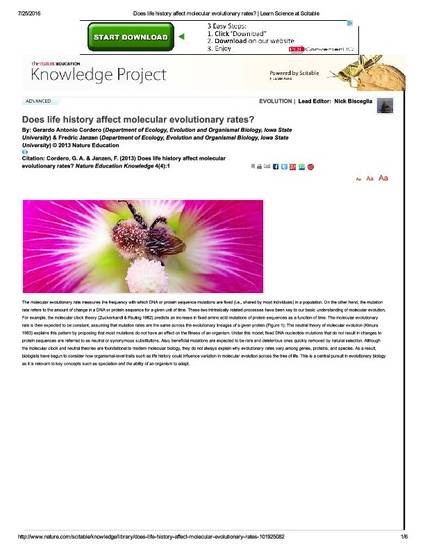
The molecular evolutionary rate measures the frequency with which DNA or protein sequence mutations are fixed (i.e., shared by most individuals) in a population. On the other hand, the mutation rate refers to the amount of change in a DNA or protein sequence for a given unit of time. These two intrinsically related processes have been key to our basic understanding of molecular evolution. For example, the molecular clock theory (Zuckerkandl & Pauling 1962) predicts an increase in fixed amino acid mutations of protein sequences as a function of time. The molecular evolutionary rate is then expected to be constant, assuming that mutation rates are the same across the evolutionary lineages of a given protein (Figure 1). The neutral theory of molecular evolution (Kimura 1983) explains this pattern by proposing that most mutations do not have an effect on the fitness of an organism. Under this model, fixed DNA nucleotide mutations that do not result in changes to protein sequences are referred to as neutral or synonymous substitutions. Also, beneficial mutations are expected to be rare and deleterious ones quickly removed by natural selection. Although the molecular clock and neutral theories are foundational to modern molecular biology, they do not always explain why evolutionary rates vary among genes, proteins, and species. As a result, biologists have begun to consider how organismal-level traits such as life history could influence variation in molecular evolution across the tree of life. This is a central pursuit in evolutionary biology as it is relevant to key concepts such as speciation and the ability of an organism to adapt.
Available at: http://works.bepress.com/fredric-janzen/21/

This article is from Nature Education Knowledge 4 (2013): 1. Posted with permission.